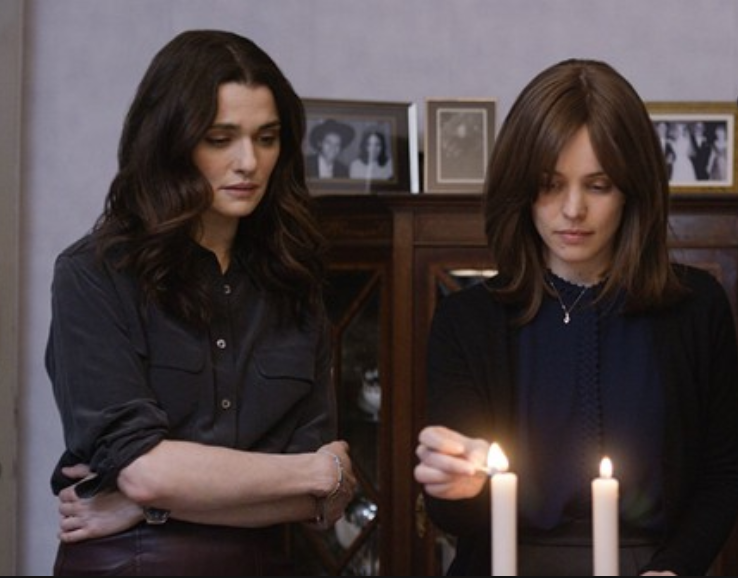With the ever-increasing amount of directorial cachet of Sebastián Lelio (garnering attention for casting a bona fide trans woman in a lead role, Daniela Vega–who then ended up being the first “openly” transgender actor to present at the Oscars) for his last film, A Fantastic Woman, the buildup to his first English language feature was nothing if not intense.
Naturally then, so, too, is the subject matter. Then again, Lelio has never shied away from topics of depth and severity, even when presented on a “minuscule” level (as was the case with 2013’s Gloria, a sort of Chilean How Stella Got Her Groove Back meets Nights of Cabiria–now set to be rebooted in English with Julianne Moore in the eponymous role). With Disobedience, Lelio takes this knack for honing in on the unique details that create the ultimate tragedy of one’s life and combines it with a tableau so generally oppressive that it’s already effortless to convey the inner torment of each main character without trying too much via the “subtleties” of filmic devices.
In Ronit’s (Rachel Weisz) case, the oppression of Orthodox Judaism in the London enclave where her father serves as a powerful and influential rabbi ultimately leads her to flee the scene at an early age for New York City, where she becomes a photographer in the style of Anna Cameron (Julia Roberts) in Closer. But it isn’t merely the fascism of the religion that sends her running for another continent–it’s also a bizarre love triangle (New Order is not, however, wielded) between her, Esti (Rachel McAdams) and Dovid (Alessandro Nivola) that skews heavily toward her forbidden love affair with the former that propels her most determinedly to the other side of the Atlantic.
While Ronit is decidedly more of an experimenter (like Stanley Milgram) than Esti, whose preference is strictly women despite her marriage of convenience to Dovid (all at the behest of the Rav Krushka [Anton Lesser]), it doesn’t change the fact that the connection between them is profound and unshakeable. That the circumstances of their reunion must come at the price of Rav Krushka’s death only adds to the constant weightiness of the rapport. Furthermore, because Ronit’s presence isn’t even expected (nor welcomed, really), the taboo nature of the entire visit is heightened, ultimately orchestrated entirely by Esti, who plays it aloof during the first act before essentially throwing herself at Ronit and confessing all of her pent up passion as they go through the personal effects of her dead father’s home–donated to the synagogue instead of bequeathed to Ronit as she had hoped. To put none too fine a point on the transcendent power of The Cure at any age and regardless of sexuality, Lelio chooses “Love Song” (or “Lovesong,” if you must) as the nostalgic track to bring all the memories flooding back to Ronit and Esti as they stand at a loss for words in the Rav’s empty house. When Esti asks her of the domicile, “Did you really want it?,” Ronit retorts, “Financial freedom? No. That would be far too easy.” It is this wit, this undeniable and constant chip on her shoulder that Esti lusts after the most when it comes to Ronit (a sarcastic Orthodox Jew is hard to find, after all).
With the Pandora’s box of rekindled ardor opened, there is no going back down the path of coy games and strained coquettish glances. They can’t put the emotions back in their formerly repressed bodies, so instead decide to go where all the freaks can be themselves: London proper–enclave-free and therefore judgment-free. In a hotel room, a sex scene that is more disgusting than titillating takes place (there’s spitting into another’s mouth involved for fuck’s sake, is this what it takes to get across the message that lesbian sex is so much more ethereal?), and we wonder if maybe Esti wanted to get caught all along–knowing full well that Ronit was the only one that could set her free from herself, from the “comfortable concentration camp” (as Betty Friedan would put it, and a phrase that feels all the more ironically resonant in this context) that she agreed to enter.
And for Esti, there is something in Ronit’s rebelliousness that inspires her–the sheer confidence she has in that concept that the Rav was talking about before keeling over: free will. As Dovid reminds the key players of the synagogue of this at the hesped, “The Rav’s final words to us…why did he choose to discuss the idea of choice? And freedom? Nothing so tender nor truthful as the true feeling of being free. Free to choose. The Rav was a giant of Torah, but he wasn’t the giant we saw collapse that day. He was a man. He talked of the angels and of the beasts. And with his final words he reminded us of this: we are free to choose!” Sometimes, however, even with the freedom of choice comes the realization that we cannot realistically choose to be with who we want to (like Lana said, “Sometimes love is not enough and the road gets tough, I don’t know why”).
Even so, the love remains in our hearts for those we must let go of in order to rise from the ashes of our former self. And this is the most constant running theme in all of Lelio’s work, English, Jewish or otherwise.




















